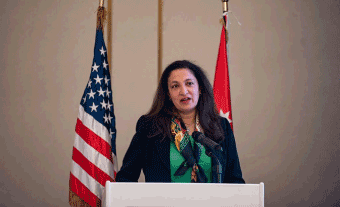You are here
Civil society organisations urge more gov't cooperation
By Rana Husseini - Dec 02,2015 - Last updated at Dec 02,2015

Civil society representatives and government officials attend the opening of the National Forum on Human Rights: Towards an Effective Partnership, on Wednesday (Petra photo)
DEAD SEA — Civil society representatives on Wednesday called for building stronger cooperation with the government, including the implementation of clear laws that govern their work.
The calls were made during the National Forum on Human Rights: Towards an Effective Partnership, which is part of the EU-funded Support to Civil Society, Dialogue and Participation in Jordan project, and was initiated by the Political and Parliamentary Affairs Ministry, and the office of the government's coordinator’s on human rights in cooperation with the National Centre for Human Rights.
The two-day event is held by the GFA Consulting Group.
Amer Bani Amer, director general of Al Hayat Centre for Civil Society Development, which includes Rased, Parliament and elected councils’ watchdog, said the government embarked on changing laws that govern the work of civil society “but left lots of room for interpretation and sometimes this works against us as civil society”.
“We need clearer laws that govern our work and the work of government employees who deal with us because on many occasions they hinder our applications or work because there are no clear rules that govern their work and how to deal with us,” Bani Amer noted.
He also said that civil society organisations have to be transparent in their work.
“Some organisations are not transparent, which reflects on all our work and credibility before the government and donors,” Bani Amer added.
Amneh Zu'bi, a former senator, said she was hopeful that the meeting will come up with results that would improve the relationship between civil society and the government, noting that they are at odds.
“The security ideology still governs the government's dealings with civil society," added Zu’bi, who headed the Jordanian Women’s Union and is now their consultant.
Noting that authorities continue to suspect civil society organisations' agendas, she said civil society should be able to monitor and question the government, “but the legal obstacles that are placed by the government are undermining our efforts”.
Zu’bi also said that the slogans and international conventions the government has adopted on human rights are promising, but "our problem is always with the implementation and the government’s commitment towards such conventions.”
Amal Haddadin, legal consultant at the Jordanian National Commission for Women, echoed Zu’bi's concerns, saying that the women’s movement “called for introducing some gender-sensitive terminology to the Constitution, but our demands were disregarded”.
“Jordan is signatory to many conventions but when it comes to women, the government is reluctant to comply with many of them, especially in terms of gender terminology and equality in areas such as legislation and labour,” Haddadin argued.
Mohammad Ensour, from the Ministry of Justice, who also took part in the dialogue, reiterated the government’s commitment towards empowering civil society.
But he pointed out that there are 4,400 registered societies in Jordan and “we cannot follow up on all of them, so we have to introduce laws that govern their work.”
Earlier in the day, EU Ambassador to Jordan Andrea Matteo Fontana said in his opening speech that the European Union has a long and well-established partnership with Jordan in support of democratic development and participatory governance.
“The EU believes that an effective dialogue is usually a continuous process based on mutual respect, inclusion, and information sharing. It takes place within established mechanisms and across the public policy spectrum: decision making, implementation, and policy impact assessment.”
The EU is a staunch supporter of human rights, he noted, and “we have consistently supported both the Jordanian government and civil society in this area.”
Since 2011, the EU invested more than 100 million euros in the area of governance and human rights, in various government and civil society programmes, the EU official said.
Minister of Political and Parliamentary Affairs Khaled Kalaldeh, who was deputising for Prime Minster Abdullah Ensour, conveyed the premier’s commitment to “working closely with civil society on the human rights file”.
Attention to human rights, Kalaldeh said, will strengthen the state and safeguard its achievements, including engaging society in the political process.
Basil Tarawneh, the government's coordinator on human rights, stressed the importance of the meeting in creating an honest dialogue between civil society and the government.
Tarawneh said the government is constantly reviewing the status of human rights in Jordan and revisiting legislation to ensure justice and protection of its citizens.
The objectives of the civil society project reflect EU policies that promote democratic and inclusive governance, according to the GFA website.
They also mirror the Democratic Empowerment Programme (Demoqrati), which lends support to social entrepreneurs to instil a culture of civic engagement, public dialogue, and participation in the making and implementation of public policy.
In implementing the new project, GFA will work with partners in the government, especially the Ministry of Political and Parliamentary Affairs, and civil society to provide the requisite technical assistance and facilitation necessary to allow and sustain inclusive public policy dialogue and participation.
Related Articles
DEAD SEA — Strengthening the role of the state through dialogue and partnership to face current challenges in the region was the main messag
The government will work on appointing PhD holders with disabilities at public universities in line with the Law on the Rights of Persons with Disabilities, according to a senior official.
AMMAN — The USAID Strengthening Civil Society and Media Systems (Sawt) Activity, implemented by Internews and partners, on Tuesday convened















